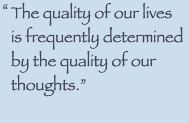 here are times when life and its troubles seem overwhelming. Maybe you think no one cares. Maybe your life feels out of control. Maybe you had a bad day.... or a bad year. Maybe a problem that you think should be easy to solve feels huge. here are times when life and its troubles seem overwhelming. Maybe you think no one cares. Maybe your life feels out of control. Maybe you had a bad day.... or a bad year. Maybe a problem that you think should be easy to solve feels huge.
I'm Carolann Freedman. I offer counseling in Seattle, and I want you to know I care about you. You are not just another face in the crowd. You have found a safe place and someone you can trust. I can't offer you a "quick fix," but I can give you credible advice and practical solutions to heal from emotional pain and have hope for the future.
|
Immediate Help...
Long-term Hope...
Lasting Healing...
Take the Hope and Healing Mental Health Quiz:
- Have you spent a great deal of time during the past few weeks thinking and worrying about this issue; are you unable to get it off your mind?
- Have you experienced a sudden weight loss or gain recently? Loss of appetite? Sleeping difficulties?
- Have you experienced difficulty concentrating or an inability to focus on the task at hand?
- Have you experienced prolonged feelings of hopelessness and despair?
- Have you begun to use alcohol or other drugs excessively, perhaps to self-medicate?
- Have you noticed a decrease in your patience and ability to manage frustration and an increase in the frequency and intensity of anger?
- Have you noticed a change in any behaviors in your spouse or other close family members which trouble you?
If you answered "yes" to any of the questions, you may benefit from speaking with a Seattle therapist or counselor. Hope and Healing Therapy in Seattle offers an initial 20-minute telephone consult at no cost to you. Get the help you need today! Call (206) 829-2422.
|
How to Find The Best Therapist or Counselor in Seattle
The first thing you need to know is that psychotherapy is an individualized process. Someone I think is first rate may not be the best fit for you. What I can tell you is that there are particular qualities that seem to be shared across the board by therapists who consistently make a difference in the lives of their clients. What to look for:
- Honesty / Candor You want someone who will call it as she or he sees it. This can be done with kindness and sensitivity, particularly with fragile clients, but hiding the truth or sugar-coating reality doesn't help anyone. Genuine compassion, care and empathy mixed with honesty and wisdom are qualities of the best therapists.
- Treatment Flexibility It's important for the therapist to recognize that not all theories of human behavior fit everyone. Therapists who insist on using one therory or style can be ineffective if the belief system or culture of the client is different from the therapist's. A great therapist is sensitive to and respectful of a wide range of belief systems and cultures.
- If it Ain't Broke, Don't Fix It Solution-focused and strength based counseling, even in the context of long-term work, has better outcomes. The best therapists aren't going to analyze what is working for you, or insist you need their services when you don't.
- Open and Complete Disclosure A good therapist will openly and honestly discuss with you any diagnosis, the content of treatment notes, any specific plans and goals, and what you can expect out of therapy. You need to feel confident that your therapist respects you, and will openly answer any questions you have about your counseling experience.
- Awareness of Limitations No therapist can effectively treat anything and everything. Ask your Seattle therapist for an example of a problem that is beyond the scope of his or her practice, or that they are insufficiently trained to treat. If they can not or will not give you an answer, I advise you to avoid them. Like many other therapists, I am a generalist. That does not, however, make me qualified to treat everyone, regardless of the issue. When might I refer to another therapist? Whenever I feel another therapist would better serve a client. An example for me would be a client who had been in jail and is now seeking sexual deviancy counseling.
|
 |
|





